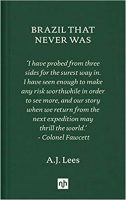 As a boy growing up in the North of England, AJ Lees was carried away by the story of a Victorian explorer, Lieutenant-Colonel Percy Fawcett, who disappeared while looking for a “lost city” he called Z in the valley of the Amazon. In Brazil That Never Was (Notting Hill Editions), Lees, now a distinguished neurologist, tries to recapture something of what he felt as a child by re-reading the work of his former hero; he also learns a great deal more about the man himself. He discovers that Fawcett wasn’t just looking for a lost city; he was immersed in the occult, and searching for a place that (as Lees puts it) “lay beyond the deceptive boundary of everyday consciousness”; a place where he could set up a community involving the worship of his own son.
As a boy growing up in the North of England, AJ Lees was carried away by the story of a Victorian explorer, Lieutenant-Colonel Percy Fawcett, who disappeared while looking for a “lost city” he called Z in the valley of the Amazon. In Brazil That Never Was (Notting Hill Editions), Lees, now a distinguished neurologist, tries to recapture something of what he felt as a child by re-reading the work of his former hero; he also learns a great deal more about the man himself. He discovers that Fawcett wasn’t just looking for a lost city; he was immersed in the occult, and searching for a place that (as Lees puts it) “lay beyond the deceptive boundary of everyday consciousness”; a place where he could set up a community involving the worship of his own son.
Lees buries himself in Fawcett’s papers, and in “a new curriculum” embracing everything from alchemy to tantra. He concludes that much of what Fawcett believed was “bunkum”, but he also declares that “the methods of reason and science that stemmed from rational consciousness were unable to provide me with a purpose to life” — and he associates Fawcett with “my longing for a time that could never return”.
His book reminded me of The Encounter by Petru Popescu, the story of how Loren McIntyre, the otherwise solidly rational American who would go on to establish the true source of the Amazon, reported having what felt like “telepathic” conversations in 1969 with the chief of an Amazonian tribe; a tribe intent on escaping loggers, drillers and missionaries by returning to “the beginning” — to pre-Columbian times.
Lees has said elsewhere that, as a boy, he wanted to become “the next David Attenborough”. I happened to open Brazil That Never Was the night after the current David Attenborough, presenting Extinction: The Facts on BBC1, had reminded us — because we still need reminding — of the interconnectedness of everything in the natural world. On page 19 of Lees’s book I came upon this: “[Richard] Spruce was the purest of all the great Victorian plant-hunters… He had walked into the hell of the dark wood and come face to face with the heart of creation. Through his time with the Indians, he realised that the natural world was a sacred web of exchange of which Man was one small part.”
Lees’s book runs to fewer than 140 pages, so I read it in one sitting. I was impatient for him to set off for Brazil himself, which he doesn’t do until 17 pages from the end. But it’s still a compelling story, with vivid images of St Helens, where he spent his early years, and Liverpool, which he visited on weekends and school holidays: “a musical somewhere else where time and being had been created by the motion of irregular, turbulent tides”.
All Notting Hill Editions’ books, which are beautifully produced, are linen-bound. This one’s in a dark green that’s surely a nod to the one Lees was handed as a child by his father in the Oakwood Library in Leeds: “a dog-eared book with soiled green cloth boards called Exploration Fawcett“.

Leave a Reply